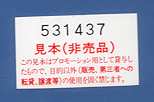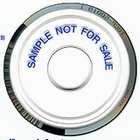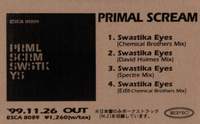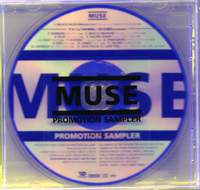
CD AlbumsMost of the new British and American albums are released in Japanese versions. They often contain 1-4 extra tracks, usually B-sides of the singles. They also include booklets or inserts with Japanese notes and full English lyrics.
They are sometimes released one or two weeks prior to their original release. I think this is due to their prices or nobody will buy expensive Japanese versions.
Not all the UK and US singles are released in Japan. Usually one or two from an album of major artists. They too often contain extra tracks and lyrics. They are usually in thick jewel cases.
Sometimes they release so called "Japan Only" singles prior to the band's Japan tour. They are mini albums containing 6-8 tracks compiled exclusively in Japan.
Japanese CD singles are usually in fat case but some singles come without back inlays like UK slim case singles.
This type of CD singles for imported music were manufactured only for a short period in the 80s. They contain 2 tracks and in unique 3"x6" sleeve.
A little note on Japanese 3"CD sinlgles
Japanese 3"CD single is in 3"x6" card sleeve with a plastic tray which is designed to be snapped in the middle to make 3"x3" case.
As you may guess, many of 3"s are snapped like this on secondhands, to us, the collectors' dismay.
The picture right shows inside of an 'intact' case. My 3" singles described as 'case snapped' are like picture above. (Pictures of 'snapped' CD is taken with a front sleeve unfolded.)
3" singles came without an obi.
Vinyls and CassettesMost of Japanese releases are CDs nowadays. Vinyls and cassettes are no longer manufactured here except for small indie labels, so-called "collectors edition" or promos.
Japanese 7" is in paper bag with a record company logo. The sleeve is a sheet of paper, often designed differently from the original single. Japanese 7" has no obi. Instead Japanese title and band name is printed on front sleeve. CDs and other vinyls have no Japanese words on front.
Obi (a Japanese word for sash) is the characteristic of Japanese (and these days, of Asian) releases. It is a small slip of paper with a title and song lists printed in Japanese, inserted between shrink-wrap and a jewel case. Its purpose is to make the CD stand out on the shelf of a shop and make it easier to find for the Japanese customers.
It is not glued to the case, so often lost on second-hands. As a matter of fact, most of us throw it away after tearing off a seal. So did I until I knew it has some value for the collectors.All Japanese releases including the singles come with English lyrics. Apart from usual credits and lyrics, Japanese booklets contain Japanese notes and the translation of lyrics and often some band photos as well.
* Some artists hate to print lyrics on booklets. However Japanese releases are exclusively allowed to print them due to the 'language barrier'.Some limited editions come with extra booklets. They are the same size as usual booklets but contains a lot of colour photographs of the band.All the Japanese promos are strictly obligated to return to the record company after use. Trading promos is illegal in Japan and the decent shops don't deal in them. Unlike in the UK or USA, getting Japanese promo is very difficult here. Strangely enough, Japanese record companies leave the bootleggers but maintain strict control of promos, so strict that an employee of a record company or a radio station will be sacked/fired for selling promos!
Japanese promos are not just scarce, they are simply unavailable!!There are several types of Japanese promos.
Sample CD
This is the commonest type of Japanese promos. It looks the same as the regular release. The only differences are a sticker with an ID number on the back and the words "sample", "promotional use only" or "not for sale" engraved around the centre hole of the disk in Japanese or English.
Pictures below are "Mansun Japan Only EP" sampler.
* The number on the sticker is an ID number and not a serial number, i.e. it's not the number of pressings. Some sellers or shops cut out the number to conceal their identity.
 numbered sticker
numbered sticker  CD centre hole
CD centre holePromo Cassette
A cassette tape in a simple and text only sleeve with the title, the song list and release information printed on colour paper. It has "not for sale" stuff printed on the tape but no ID number.
* Japanese versions are often released prior to their UK and US releases, which means those tapes are often pre-mastering cassettes and the track orders or titles might be different from the official releases. Also they don't include bonus tracks for the same reason.
 Primal Scream - Swastica Eyes cassette promo
Primal Scream - Swastica Eyes cassette promo
CD Promo
This type of promo is hardest to find and not produced for every release. They come in various forms. Some come with an elaborate original sleeve and a booklet, some have no sleeve at all, and some are imported promos with a Japanese sticker on it.
'Real' Japanese promos have no obi. The CDs with obi that are sold as promos are sample CDs.
 Muse - Showbiz CD promo
Muse - Showbiz CD promo CD-R Promo
Nowadays, most of Japanese promos are CD-Rs. They come in a slim case with an inlay.
 South - With The Tides CD-R promo
South - With The Tides CD-R promo
Other Promos
There were vinyl promos and flexi promos but they are no longer produced.Promo Box Set
Please be aware of so-called "Japanese promo box sets" often sold at eBay.
They are made by Disc Union, a Japanese record shop. It's a gift for those who bought complete set of paper sleeve (mini LP) CDs from the shop. It's shop-made and not at all official nor a promo. As long as they are available from the shop, I can buy them and send them to you. Though their price is expensive and there's no discount, my price would be cheaper than that of eBay sellers.
Japanese record companies rarely release a promo box set, and if it's a real promo, the price will be exorbitant, not just $100-200 like eBay items.
Also, please remember "Japanese promos" sold at eBay and other shops are very often not promos at all. They are mostly shop-made freebies or bootlegs. As mentioned above, REAL Japanese promos are extremely hard-to-get.
All my promos are genuine, manufactured by Japanese record companies for a promotional purpose.
Japan is a bootleggers' paradise. It's a shame but actually the bands themselves shop at those bootleg shops when they tour Japan!!
Basically Japanese bootleg CDs (CD-Rs nowadays) have high sound quality (thanks to digital technology) and in fancy sleeves. But their prices are exorbitant! A new single album is sold for 3800-5000 yen and a video (DVD-Rs nowadays) for 3500-5000 yen.
All the "unofficial" CDs/CD-Rs in the catalogue are pro-made and come with picture sleeves, labels, inlays etc. Japanese printing technology is the best in the world. So Japanese concert flyers look very nice, though they don't have much Japanese writings due to aesthetic reasons. So were the tour programmes but unfortunately they stopped printing original programmes for Japan tour except for a few big names, probably because of the cost.
They often say Japanese music magazines are the best in the world. As for the pictures, yes. I think the text is rubbish, however, unimaginative, unintelligent, boring, interviewers even don't speak English and worst of all, completely lacks the sense of humour!
There must be over 100 music magazines published in Japan and at least 10 of them are rock magazines. Japanese music lovers seem to be good readers. Or are they after the pics like me?
FAQ
Why are the Japanese CDs so expensive? Especially the CD singles?
Because they are expensive here too. Please understand that a new Japanese single costs as much as a new imported album here. Also a discount of new records is banned by law (to protect Japanese record industry against the imports) and they are not much cheaper even on secondhands.
In addition to that, the number of pressing of Japanese releases is very limited compared to the original British/American releases. Some of the Japanese singles are rather hard to get even when it's released!
And these make them ideal collectors' items. :-)
I heard that sound quality of Japanese CDs is better than UK or US releases. Is it true?
Well, so say Japanese record companies but I'm not sure. All Japanese CDs are manufactured in Japan but the master discs come from abroad. The high quality control of Japanese factories is the source of the rumour, I suppose.
Also the quality control of 'used' CDs is strict here too! I sometimes receive an email from a surprised customer, saying "I bought a used CD from you but it was new!". Of course it's not. :-)